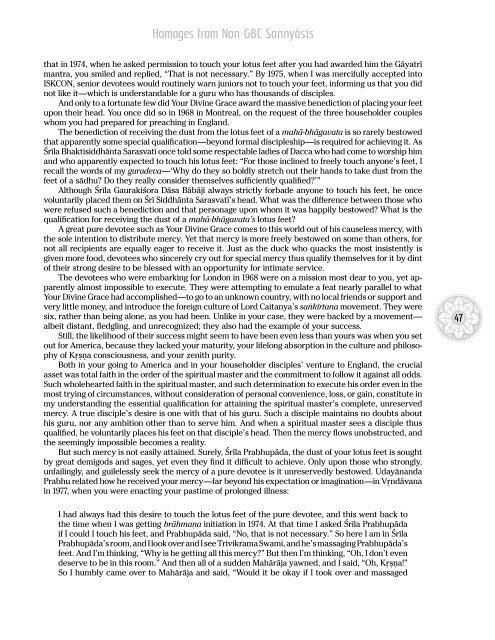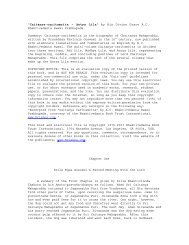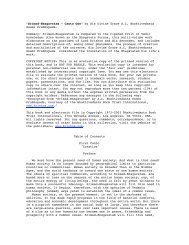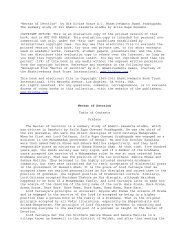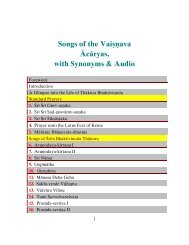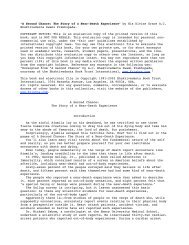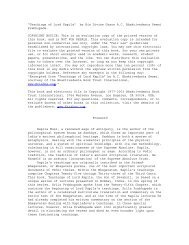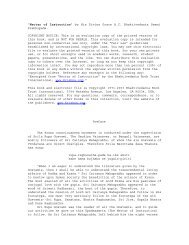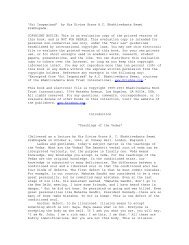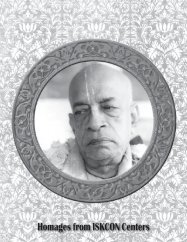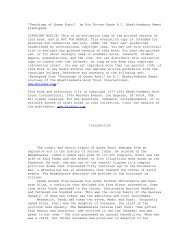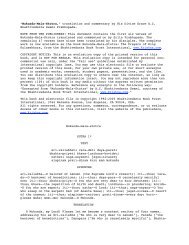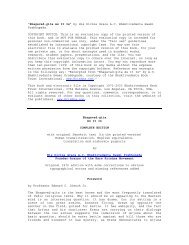Non-GBC Sannyäsés
Non-GBC Sannyäsés
Non-GBC Sannyäsés
You also want an ePaper? Increase the reach of your titles
YUMPU automatically turns print PDFs into web optimized ePapers that Google loves.
Homages from <strong>Non</strong>-<strong>GBC</strong> Sannyāsīs<br />
that in 1974, when he asked permission to touch your lotus feet after you had awarded him the Gäyatré<br />
mantra, you smiled and replied, “That is not necessary.” By 1975, when I was mercifully accepted into<br />
ISKCON, senior devotees would routinely warn juniors not to touch your feet, informing us that you did<br />
not like it—which is understandable for a guru who has thousands of disciples.<br />
And only to a fortunate few did Your Divine Grace award the massive benediction of placing your feet<br />
upon their head. You once did so in 1968 in Montreal, on the request of the three householder couples<br />
whom you had prepared for preaching in England.<br />
The benediction of receiving the dust from the lotus feet of a mahä-bhägavata is so rarely bestowed<br />
that apparently some special qualication—beyond formal discipleship—is required for achieving it. As<br />
Çréla Bhaktisiddhänta Sarasvaté once told some respectable ladies of Dacca who had come to worship him<br />
and who apparently expected to touch his lotus feet: “For those inclined to freely touch anyone’s feet, I<br />
recall the words of my gurudeva—‘Why do they so boldly stretch out their hands to take dust from the<br />
feet of a sädhu? Do they really consider themselves sufciently qualied?’”<br />
Although Çréla Gaurakiçora Däsa Bäbäjé always strictly forbade anyone to touch his feet, he once<br />
voluntarily placed them on Çré Siddhänta Sarasvaté’s head. What was the difference between those who<br />
were refused such a benediction and that personage upon whom it was happily bestowed? What is the<br />
qualication for receiving the dust of a mahä-bhägavata’s lotus feet?<br />
A great pure devotee such as Your Divine Grace comes to this world out of his causeless mercy, with<br />
the sole intention to distribute mercy. Yet that mercy is more freely bestowed on some than others, for<br />
not all recipients are equally eager to receive it. Just as the duck who quacks the most insistently is<br />
given more food, devotees who sincerely cry out for special mercy thus qualify themselves for it by dint<br />
of their strong desire to be blessed with an opportunity for intimate service.<br />
The devotees who were embarking for London in 1968 were on a mission most dear to you, yet apparently<br />
almost impossible to execute. They were attempting to emulate a feat nearly parallel to what<br />
Your Divine Grace had accomplished—to go to an unknown country, with no local friends or support and<br />
very little money, and introduce the foreign culture of Lord Caitanya’s saìkértana movement. They were<br />
six, rather than being alone, as you had been. Unlike in your case, they were backed by a movement—<br />
albeit distant, edgling, and unrecognized; they also had the example of your success.<br />
Still, the likelihood of their success might seem to have been even less than yours was when you set<br />
out for America, because they lacked your maturity, your lifelong absorption in the culture and philosophy<br />
of Kåñëa consciousness, and your zenith purity.<br />
Both in your going to America and in your householder disciples’ venture to England, the crucial<br />
asset was total faith in the order of the spiritual master and the commitment to follow it against all odds.<br />
Such wholehearted faith in the spiritual master, and such determination to execute his order even in the<br />
most trying of circumstances, without consideration of personal convenience, loss, or gain, constitute in<br />
my understanding the essential qualication for attaining the spiritual master’s complete, unreserved<br />
mercy. A true disciple’s desire is one with that of his guru. Such a disciple maintains no doubts about<br />
his guru, nor any ambition other than to serve him. And when a spiritual master sees a disciple thus<br />
qualied, he voluntarily places his feet on that disciple’s head. Then the mercy ows unobstructed, and<br />
the seemingly impossible becomes a reality.<br />
But such mercy is not easily attained. Surely, Çréla Prabhupäda, the dust of your lotus feet is sought<br />
by great demigods and sages, yet even they nd it difcult to achieve. Only upon those who strongly,<br />
unfailingly, and guilelessly seek the mercy of a pure devotee is it unreservedly bestowed. Udayänanda<br />
Prabhu related how he received your mercy—far beyond his expectation or imagination—in Våndävana<br />
in 1977, when you were enacting your pastime of prolonged illness:<br />
I had always had this desire to touch the lotus feet of the pure devotee, and this went back to<br />
the time when I was getting brähmaëa initiation in 1974. At that time I asked Çréla Prabhupäda<br />
if I could I touch his feet, and Prabhupäda said, “No, that is not necessary.” So here I am in Çréla<br />
Prabhupäda’s room, and I look over and I see Trivikrama Swami, and he’s massaging Prabhupäda’s<br />
feet. And I’m thinking, “Why is he getting all this mercy?” But then I’m thinking, “Oh, I don’t even<br />
deserve to be in this room.” And then all of a sudden Mahäräja yawned, and I said, “Oh, Kåñëa!”<br />
So I humbly came over to Mahäräja and said, “Would it be okay if I took over and massaged<br />
47


